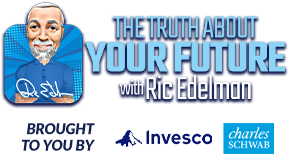Guardian of the Brain
The surprising beneficial side effect of flu shots
Ric Edelman: It's Wednesday, January 31st. I want to give you an update on Alzheimer's disease. You know, before you can defeat this scourge, we've got to know you have it first. And the sooner you know, the better. You can fight it. Right now, you've got to wait for symptoms to show up, but you might actually have Alzheimer's for years without even realizing it. And so there's as much effort to create diagnostic tools as there is to create treatments and a cure.
Right now, there are only two ways to reliably test for Alzheimer's a spinal tap or a PET scan. They're 90% accurate, but the machines are not widely available, and the test is expensive. Cost six grand. It's not covered by insurance. So there's a lot of effort to come up with new diagnostic tools that are faster, better, cheaper, and more accurate.
And here's one idea for an Alzheimer's test checking your eyesight A company called RetiSpec has developed an AI algorithm that it says can detect signs of Alzheimer's 20 years before symptoms develop. Another company, called NeuroVision, is using machine learning to develop retinal scans and blood tests.
Another company called PATH Biotech is looking at genetic triggers, and another company is SpeechDx. They're looking at recorded voice samples. Studies show that subtle changes in speech and language patterns can predict Alzheimer's. Their work is supported by the Alzheimer's Drug Discovery Foundation, ADDF. I'm on the board there, and it's part of the efforts of Jean and me to fight the disease.
There's a new experimental drug also to fight the disease itself, and it just passed an early safety test. The drug is now moving to a larger clinical trial. The drug is being developed by Acumen Pharmaceuticals. Its name for now is ACI 193. Not very sexy. They'll come up with a cute name later. The drug was tested on 62 people, and nobody died. Five of them developed a brain swelling condition, but only one got symptoms which went away after they stopped taking the drug. Another four developed bleeding in the brain. These are actually really good results, enough to let the drug tests continue. The drug is meant to attack amyloid beta oligomers. That's a protein that creates plaque in the brain associated with Alzheimer's disease. That's pretty cool.
Also, simultaneously, the New England Journal of Medicine has reported that focused ultrasound might help fight Alzheimer's, too. And maybe you even saw the report on 60 Minutes. The blood brain barrier is something in our heads that prevent harmful substances from getting into the brain, but that barrier also stops medicine from getting there. So a medical team is now used, focused ultrasound to disrupt the blood brain barrier to allow monoclonal antibodies to enter the brain.
The result? Immediate improvement for the patient on a noninvasive basis. After six months of treatment, a 32% reduction in plaque clinical trial is continuing, and if it works, this could lead to treatment for other neurodegenerative disorders as well Parkinson's disease, Huntington's disease, ALS, brain tumors, and more.
Meantime, there's a study that has found that the influenza vaccine, you know, the flu vaccine, could reduce Alzheimer's risk by 40%. And getting the shingles vaccine cuts your Alzheimer's risk by 25%. And getting the pneumococcal vaccine cuts your risk by 27%. Wow. Getting all of these shots for vaccines not only protects you from the flu, but it protects you from Alzheimer's.
And finally, there's new research that says vitamin D deficiency can increase your risk of early dementia. In a study published in the Journal of the American Medical Association, they analyzed information from nearly 400,000 people who were younger than age 65. They followed these people for over ten years, and they compared those who took vitamin D supplements to those who didn't. 75% of those who develop dementia within ten years did not take the vitamin D supplements. Those who did take the supplements, only 25% of them developed dementia. It looks like something as simple and easy as vitamin D can be a big help. I wouldn't even be surprised if you're not already taking that supplement I am. I'll keep you posted on all of this.
You're listening to the truth about your future. Have you been thinking about buying bitcoin? I bet you have. With the introduction of the new spot bitcoin ETFs, everybody's talking about them. They represent the most exciting new product innovation and investment management in years, and the biggest news for crypto in a decade. But before you even think about investing, you need to know all about them and what they all mean for your portfolio and your financial future. To help you, I've created two toolkits to give you the information you need one for financial advisors, another one for investors. Both are available to you to read and download for free. Both toolkits include a simple one-page chart that lets you easily and quickly compare all the different ETFs, so you can see how they differ. Plus, I've got videos for you, a cool infographic, plus the full schedule of my webinars and podcasts that you can watch and hear about these new spot bitcoin ETFs. And all of it's free; check out the Advisor Toolkit and the Investor Toolkit.
-----



